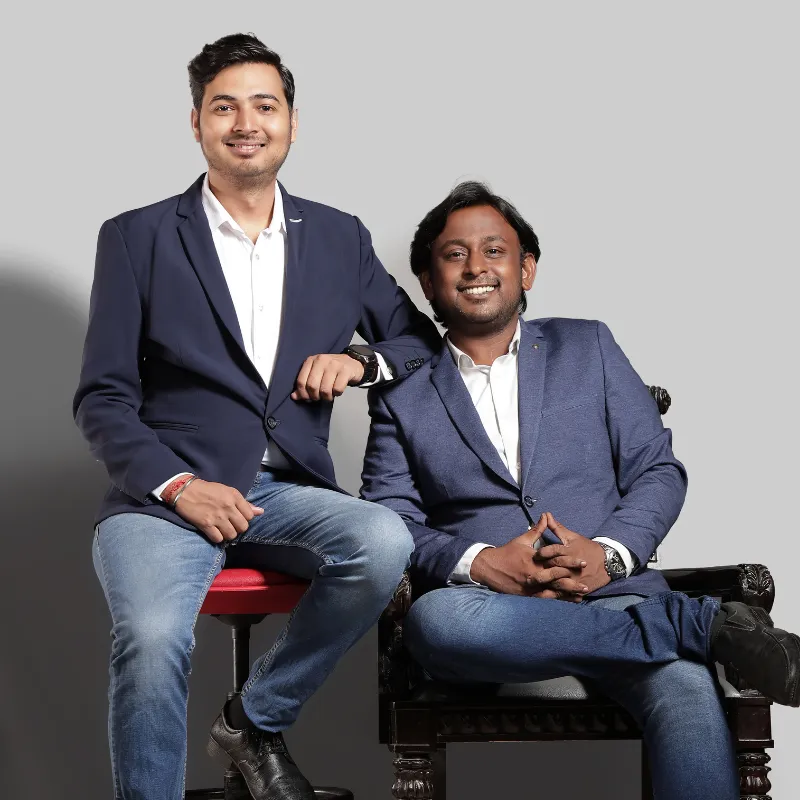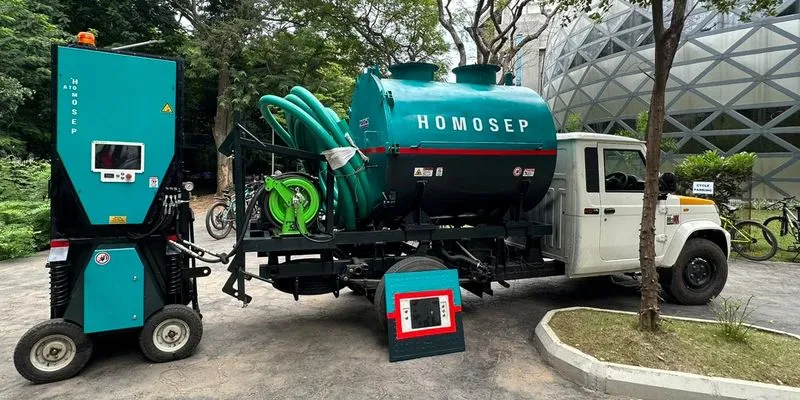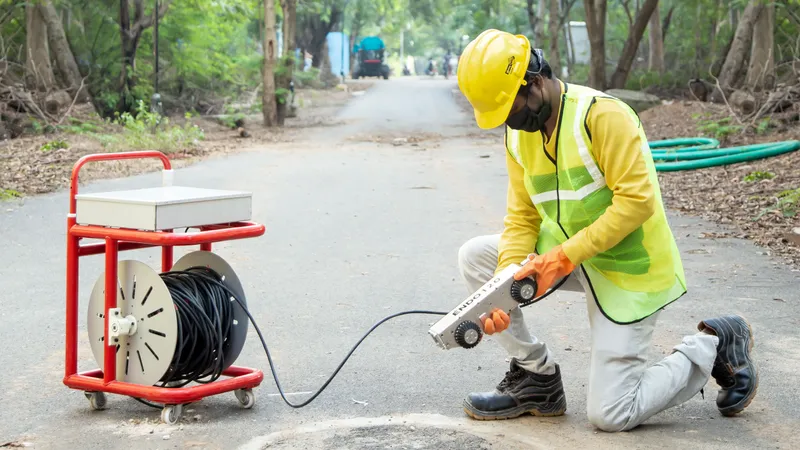This startup’s robotic solutions help clean manholes, septic tanks, and pipelines
Solinas Integrity, a startup developed and incubated at IIT-Madras, has developed robotic solutions to address water contamination, blockages, and leakages. The startup hopes these solutions will eradicate manual scavenging completely.
While preparing for his IIT-JEE exams, Divanshu Kumar’s goal was to study mechanical engineering at IIT-Kanpur. But fate had other plans. He missed admission into the institution by a mark and landed at IIT-Madras instead.
Looking back, Kumar terms the turn of events as a blessing in disguise. His five-year stint in IIT-Madras for a BTech in mechanical engineering and a master’s in product design led him to become an entrepreneur and launch two startups while in college.

Divanshu Kumar and Moinak Banerjee - Co-founders of Solinas Integrity
The first startup, Involve, launched during his second year, equips students from higher grades to teach and mentor their juniors from low-income families via a nine-month fellowship.
In the final year of college, Kumar worked on a project to develop a robot for cleaning manholes and septic tanks.
“I got introduced to the water and sanitation sector. As someone who likes technology, I found the project very interesting as it could solve a lot of problems in this sector. We also got an award from the Prime Minister, and I started thinking about whether it was a good time for us to take it beyond a college project,” says Kumar.
This idea led to the birth of Integrity, a startup that has emerged from IIT-Madras to develop deep and climate-tech solutions that have sustainability at their core.
From a college project to a startup
Initially, Solinas was envisaged as a college project. Kumar recollects his team presenting the project to manual scavengers in Chennai.
“I could see them laughing after the presentation was done. It hurt my pride to see that the technology we had developed was being laughed at. When they asked us whether we had actually seen a manhole or a septic tank being cleaned, I realised we hadn’t. They showed us how their nails and their skin were affected and asked us to join them at a cleaning site at midnight,” he recalls.

HomoSep
The visit led to a deeper interest to find the right products for the task.
The initial prototype had been developed as a bio propulsion-based movement robot that went inside the septic tank where the fluid was less dense and viscous. But now the team understood that their solution would not work in manholes and septic tanks. This led to a newer prototype that worked well.
In 2018, Kumar and his professor deliberated on what to do next—whether to leave the prototype as a college project or take it forward as a startup. Around this time, Moinak Banerjee joined in as co-founder, and they started building a team.
Kumar points out that cleaning septic tanks is just one of the problems in urban water sanitation management. Water and sanitation are interconnected, and all assets, including the water pipelines, the drainage systems, the septic tanks, and the sewer pipelines, are all underground. Their inspection and cleaning aren’t completely manual;, even today, at times, the tasks require human intervention.
The idea was to leverage technology to look at where the problem was so that it could be solved faster. A sewer could overflow multiple times; so where did the chokage happen? Why did it happen? Is there a design issue underground? These challenges could be addressed through leveraging data and robotics, the team concluded.
Far-reaching tech solutions

EndoBot being deployed
Solinas Integrity built HomeSep, India’s first septic tank and manhole cleaning robot that comes with cleaning blades, a suction mechanism, storage, and transportation option.
After this, the team developed EndoBot—an “endoscopy” kind of robot for all kinds of pipelines—water, sewage, drainage—where the robot is sent into the system to look at conditions, defects, and points to the exact problem and provides data on it.
The Endo90 can go into pipes as small as 90 mm in diameter as most of the water distribution pipelines are between 80 mm and 200 mm. The Endo90 is already being used in 12 cities for pipeline inspections.
“Another challenge arose before us—how do we clean the horizontal sewer pipelines that are blocked? For this, we are developing the Rehabiliation Bot or R-Bot with a grant from ACT. This will be a game changer for us because so far, there has been no proper solution for cleaning horizontal systems,” Kumar explains.
ACT for Environment’s grant will help Solinas accelerate the development and deployment of the R-Bot with municipalities and O&M (operations and maintenance) players.
Along with these innovations, Solinas Integrity has also launched Swasth, a digital cloud AI dashboard for conditional assessment and data management, to identify defect coding, defect grading and risk assessment. It offers GIS tagging of defect location and pipeline auditing.
The data collected through EndoBot is processed, and a customised report is generated in the Swasth dashboard.
These insights at a micro level will help predict challenges and take action on time. says Kumar.
Swasth has been deployed with a couple of private companies, and the startup hopes to expand its client base soon.
“We have given the government free access at a couple of places but since it’s a tech-heavy solution, adoption will take time,” remarks Kumar.
The benefits of privatisation
He points out that privatisation has brought in players who now lay down pipelines and are responsible for operation and maintenance. So, this is the right time for Solinas Integrity to scale its efforts, he believes.
“Privatisation has worked very well for us because the moment they (private players) know such a technology exists that can reduce their labour costs and come with data they will jump on it.
“Secondly, the government’s investment in policies, like the eradication of manual scavenging, Jal Jeevan mission, and Amruth Mission, is seeing a lot of buzz in this sector. Additionally, this sector is also seeing a huge investment in infrastructure,” he elaborates.
As for social impact, apart from helping remove manual scavenging altogether, Solinas’ robotic products also help in identifying contamination, pinpoint specific problems, and offer solutions.
“In Hubbali, we worked with L&T to focus on identifying contamination, leakage and blockage points, and worked on fixing these. Around 1,000 urban slum households that were not getting water for almost two years finally got potable water. Technology like this can be a game changer for cities because we can save around 400,000 to 600,000 litres of water for every kilometre of inspection,” he explains.
Solinas has deployed its solutions in over 15 cities in nine states. It has also started applying to tenders to work directly with the government. It has so far raised funding over two rounds.
“Our prime focus is India, but we have already started exploring the Middle East and Southeast Asian markets. One of our scale strategies is to shift from smaller chunks of orders to bigger ones. We are targeting projects over a crore that will push our revenues further,” says Kumar.
(The story has been updated to change the number of funding rounds.)
Edited by Swetha Kannan






